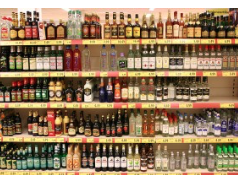By McKenna Harford
KU Statehouse Wire Service
TOPEKA – Proponents shared reasons for allowing grocery and convenience stores to move into the more lucrative market of wine and full-strength beer sales with the House Commerce, Labor and Economic Development Committee on Monday.
House Bill 2282 would allow sales of wine and beer in grocery and convenience stores, and the sales of liquor, wine and beer in liquor stores. The bill also would allow liquor stores to sell other products outside of alcohol, and would allow stores to have multiple liquor licenses.
Opponents will give testimony to the committee Tuesday.
Currently, grocery and convenience stores are only allowed to sell beer with 3.2 percent alcohol content. Proponents said Kansas liquor laws are antiquated and limit businesses’ ability to meet customer demand.
Tom Palace, executive director of the Petroleum Marketers and Convenience Store Association of Kansas, said that people don’t want to buy 3.2 percent beer, and brewers have begun phasing this product out.
“3.2 is viewed as a lesser product,” Palace said. “People don’t want to buy it. Our customers want to buy the real beer.”
The bill is modeled after an Oklahoma bill that passed in November. After that bill goes into effect, Kansas will be one of only three states that sells 3.2 percent beer.
Karen Washburn, a Lenexa resident, testified that the current situation is inconvenient and unaccommodating to customers.
“What I find myself having to do in order to economize my time is to go to a grocery store that does offer wine sales and guess what? Those are about three miles across the state line,” Washburn said.
Dick Stoffer, director for state government relations for Hy-vee, said Kansas’ restrictive liquor laws are a main reason that the Hy-vee chain has not expanded in Kansas. Stoffer said this means Kansas is missing out on the reinvestments Hy-vee offers.
“Dollars made in Hy-vee are put back into communities that we go to or where we are existing,” Stoffer said.
Written testimony provided by Whole Foods Market also said the laws can prevent the chain from expanding in Kansas.
“When we look for new sites, locations where the laws allow us to sell alcoholic beverages are certainly preferable,” Whole Foods Market licensing team leader Ryan Bissett said in the written testimony. “In fact, our ability to sell alcoholic beverages could be the deciding factor in determining whether to sign a lease for a new site or not.”
Representatives who heard the testimony questioned how the bill would affect the market, including smaller liquor stores.
Rep. Ken Corbet (R-Topeka) said he isn’t sure whether allowing grocery stores to sell alcohol is worth the economic value when the law might hurt small liquor businesses.
“My concern is if you’re a small business person then you’re a little more fragile on day to day activities than a Dillons, Hy-vee or a corporation,” Corbet said. “I’m truly not sure if the big corporations will employ any additional help, where on the other hand for every small liquor store that goes out of business in a small town they lose the property tax, the insurance agents, the employees will drop off. I think that the financial impact will be a lot harder.”
McKenna Harford is a senior journalism major at the University of Kansas from San Antonio, Texas.
